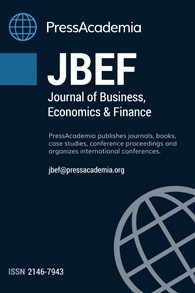A COMPARISON OF THE IMPACTS BETWEEN TURKEY AND FIVE SELECTED DEVELOPING ECONOMIES DURING THE GLOBAL FINANCIAL CRISIS
Purpose- We would like to examine the impacts of the global economic crisis on the Turkish economy and compare it with some other developing economies like Brazil, Russian Federation, India, China, and South Africa, namely the BRICS countries. We chose these countries because they are well-known developing countries in the world. Methodology- We compared the economic variables of unemployment rates, current deficit, GDP growth, and foreign direct investments for each country. Therefore, we obtained statistics from the World Bank and analyzed them. Findings- The banking and financial sector showed a similar trend in all countries. Developing countries did not take a direct hit to the banking sector because of robust regulations in the banking sector, relatively low toxic assets, and fiscal & monetary measures taken in developing countries. Consequently, country-specific factors played an essential role in some countries. Especially for South Africa, the FIFA World Cup held in 2010 was influential in offsetting the crisis’s adverse effects. Also, for the Russian Federation, Georgia’s occupation in 2008 led to the protest against Russian goods, and therefore demand for Russian goods decreased Conclusion- As a result, it is concluded that Turkey and the Russian Federation were directly hit by the crisis with substantial reductions in economic growth and unemployment rates. In China, India, Brazil, and South Africa, GDP growth and unemployment rates did not change greatly. Except for Turkey and the Russian Federation, other countries were not primarily affected by the global financial crisis. For the current account balance, there is a whole different scenario. Commodity and oil exporter countries like Russia were severely affected by decreasing oil prices in terms of the current account. Meanwhile, oil and commodity importer countries like Turkey were less damaged and had their lowest current account deficit in this era
Keywords:
Crisis, economic growth, unemployment, BRICS economic indicators,
___
- Babacan, A. (2009). Global Financial Crisis and the Turkish Economy. ˙Website: www2.lse.ac.uk/publicEvents/pdf/20090917. (Retrieved 10/07/2020).
- Bai, L. (2012). Effects of Global Financial Crisis on Chinese Export: A Gravity Model Study.
- Barannik, D. (2010). In Search of “The Russian Path”: Impact of the 2008 Crisis on Russia’s Economic Policy.
- Baxter, R. (2009). The Global Economic Crisis and Its Impact on South Africa and The Country’s Mining Industry. Challenges for Monetary Policy-Makers in Emerging Markets, 105-116.
- Cömert, H., & Çolak, M. S. (2016). The Impacts of the Global Crisis on the Turkish Economy, And Policy Responses. In The Global South after the Crisis. Edward Elgar Publishing.
- Conrad, J., Lanzeni, M. L., Nestmann, T., Giesel, B., & Walter, N. (2009). Russia in the financial crisis and beyond. Deutsche Bank Research.
- Ferrari Filho, F. (2011). Brazil’s Response to the International Financial Crisis: How Did Financial Regulation and Monetary Policy Influence the Brazil’s Economic Recovery?
- Gotham, K. F. (2009). Creating Liquidity Out of Spatial Fixity: The Secondary Circuit of Capital and The Subprime Mortgage Crisis. International Journal of Urban and Regional Research, 33(2), 355-371.
- Hoffmann, D. (2011). The Impact of the Financial Crisis in Brazil and Germany: A Comparative Analysis of Distinct Developments. Universida De Federal Do Rio De Jeneiro.
- Kumar, R., Debroy, B., Ghosh, J., Mahajan, V., & Prabhu, K. S. (2009). Global Financial Crisis: Impact on India’s Poor: Some Initial Perspectives. UNDP: India, available online at http://data.undp.org.in/FinancialCrisis/FinalFCP.pdf
- Leunig, T. (2006). Time Is Money: A Re-Assessment of the Passenger Social Savings from Victorian British Railways. The Journal of Economic History, 66(3), 635-673.
- Mendonça de Barros, J. R. (2010). The impact of the international financial crisis on Brazil (ARI), Real Instituto Elcano.
- Mishkin, F. S. (2007). The Economics of Money, Banking, and Financial Markets. Pearson Education.
- rod, V. (2010). Global Economic Recession: Effects and Implications for South Africa at a Time of Political Challenges. Claves De La Economia Mundial.
- Rodrik, D. (2009). The Turkish Economy after the Crisis. Turkish Economic Association. Discussion Paper 2009/9. Retrieved October 4, 2014, from http://www.tek.org.tr/dosyalar/RODRIKTEK.paper.pdf.
- Sun, X. (2009). The Impact of World Economic Crisis on China Economy.
- Sutela, P. (2010). Russia’s Response to the Global Financial Crisis. Электронный ресурс]. -Режим доступа: http://carnegieendowment. org.
- Viswanathan, K. G. (2010). The Global Financial Crisis and Its Impact on India. J. Int’ l Bus. & L., 9, 41.
- Williamson, J. (2009). The Impact of the Global Financial Crisis on Brazil. Economics, Management, and Financial Markets, 4(1), 172-177.
- Yongding, Y. (2010). The Impact of the Global Financial Crisis on the Chinese Economy and China’s Policy Responses. TWN Global Economy Series, (25).
- https://www.worldbank.org/ (Retrieved 12/07/2020)
- Yayın Aralığı: Yılda 4 Sayı
- Başlangıç: 2012
- Yayıncı: PressAcademia
